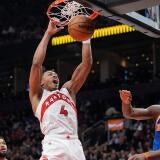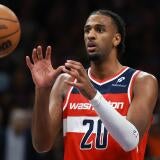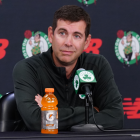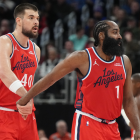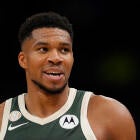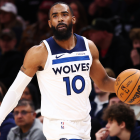2014 FIBA World Cup: Previewing the Round of 16
With the group play over and USA vs. Spain for the gold medal collision course set, let's take a preview look at the Round of 16 in the FIBA World Cup.

After 60 games of group play through six days of the 2014 FIBA World Cup, we've settled on the 16 best teams to make it through to the elimination rounds. Three teams made it through with perfect records and we have a tournament bracket that should yield a gold medal game of the United States battling Spain.
What does the lay of the land look like? Which teams have the toughest do-or-die match-ups in their Round of 16 games? Let's preview the Round of 16:
TEAM USA vs. MEXICO -- Saturday, 10:00am ET
How did USA get here? USA Basketball went 5-0 in group play with the highest point differential for the tournament so far. Their plus-166 through the first five games was 40 points better than the second best team Spain, who had a plus-126. USA's five wins came against Finland (plus-59), Turkey (plus-21), New Zealand (plus-27), Dominican Republic (plus-35), and Ukraine (plus-24).
Anthony Davis and Kenneth Faried have been the difference-makers for USA Basketball. Their energy and athleticism around the rim have help spark the lackluster starts and inconsistent energy during the first five games. Davis leads the team in scoring with 15.8 points per game. He's also averaging 6.4 rebounds and 1.8 blocks in just 20.2 minutes. Faried is second in scoring (13.8) and first in rebounding (7.8). He's also leading the team in field goal percentage (79.1 percent).
How did Mexico get here? Mexico went 2-3 in their Group D play, and were the most competitive team in the tournament with a losing record. Their point differential was a minus-2. Mexico lost their first two games handedly. Lithuania took them down by 13 points and they lost Slovenia by 21 points. They bounced back strongly with a 24-point win against Angola before dropping a game to Australia by eight points. Mexico sealed their fate of advancing to the Round of 16 with a 16-point win over Korea in their fifth game.
NBA big man Gustavo Ayon has been the catalyst for this Mexico team. He's their leading scorer (15.4 points) and rebounder (7.5). Shooting guard Francisco Cruz has been their second leading scorer and a nice balance outside to what Ayon is doing in the paint. Cruz hasn't been much of a 3-point shooter (30.3 percent) but power forward Hector Hernandez has done a great job of stretching the floor with 44.4 percent shooting on 5.4 3-point attempts per game.
Key match-up: The frontcourt match-up of Faried and Davis against Ayon and Hernandez will be the key to how easily USA is able to dispatch Mexico. Jorge Gutierrez handling defensive pressure is big for Mexico but Ayon being neutralized inside and Hernandez not hitting from the perimeter will be the difference. Handling Ayon inside shouldn't be too tough for Davis. His length should be able to bother the craftiness and strength of Ayon, but Faried will have to be disciplined in not leaving Hernandez open.
Outlook for the game: This is a game the US should win by a good 30 or 40 points, but can they avoid the slow start and put this away early? Loser goes home and the winner plays the victor of Dominican Republic and Slovenia on Tuesday.
CROATIA vs. FRANCE -- Saturday, 11:50am ET
How did Croatia get here? Croatia went 3-2 in Group B play. They started out 2-0 win a three-point win over the Philippines and a five-point win over Argentina. Then they were upset by Senegal in an exciting two-point loss and dropped their game to Greece by 11 points. They finished off their group play with a convincing 21-point win over Puerto Rico to finish second in the group.
One of the newest Nets' guards Bojan Bogdanovic has been the leader of this team in the tournament. He's averaging 20.0 points (sixth leading scorer in the tournament) while making 47.6 percent of his shots. Recent Sixers' lottery pick Dario Saric is the second leading scorer (13.2) and rebounder (6.6) as a nice complement to Ante Tomic inside. Saric has had some spectacular, athletic plays and also lost a few teeth early on in the tournament.
How did France get here? France went 3-2 in the toughest group of the 2014 World Cup -- Group A. They finished behind Spain and Brazil by dropping a two-point thriller to Brazil in their first game. They came back with back-to-back wins over Serbia (one-point win) and Egypt (39-point victory) before getting obliterated by Spain (24-point loss) in what went from a very entertaining game in the first half to a blowout in the second. They finished off group play with a five-point win over Iran.
Surprisingly, big man Joffrey Lauvergne has been the leading scorer (10.4) for France in this tournament, as they deal with life sans Tony Parker and Nando De Colo. Nicolas Batum has struggled and been inconsistent while Boris Diaw works on getting everybody involved. The point guard duo of Thomas Huertel and Antoine Diot (both 25 years old) has given very encouraging play so far.
Key match-up: How do Saric and Tomic match up with Lauvergne and Diaw? Tomic has the size advantage for Croatia but Diaw could pick the young Saric apart with his veteran play and tricks. If these two frontcourts are able to match each other head-to-head, we could see this game come down to Batum finally having a dominating game on both ends vs. Bogdanovic using a big scoring effort to advance his team.
Outlook for the game: France should be the favorite to win this game. Even without Parker leading them, they've shown a great balance without relying on their stars so far. If Batum can shut down Bogdanovic, France should advance. Loser goes home and winner plays the winner of Spain vs. Senegal.
SLOVENIA vs. DOMINICAN REPUBLIC -- Saturday 1:50pm ET
How did Slovenia get here? Slovenia came in second in Group D with a 4-1 record. They tied the Group D winner Lithuania but lost to them by three in their match-up. That came after winning their first four games of group play. They beat Australia by 10, Mexico by 21, and Korea by 17. Their win over Angola was only by six points, which was surprising given how they should have dominated that match-up. Slovenia scored two points in the fourth quarter against Lithuania in their final game of group play.
Slovenia is a guard heavy attack, spurred by the Dragic brothers. All-NBA point guard Goran Dragic and his brother Zoran Dragic have been at the forefront of every attack for this team. Domen Lorbek has been the other guard helping lead the team in scoring. Those three accounted for nearly half (49.1 percent) of Slovenia's scoring in the first five games. Goran leads the team in points (17.4) and assists (4.0) while his brother and Lorbek each average 12.2 points.
How did Dominican Republic get here? Dominican Republic posted a 2-3 record in their Group C effort. They lost to Ukraine by 10 points before beating New Zealand by 13. Then they defeated Finland by six before succumbing to the United States by 35 points. They couldn't rally in their last game to beat Turkey and ended up losing by 13 points. In the big loss to the United States, they played without Francisco Garcia, who was out with a sprained ankle. He wouldn't have made a difference but their losses wouldn't look so bad without that big drop-off.
Garcia has been the leader of this team. The Rockets' wing defender and shooter leads the team with 20.3 points per game, good for fifth in the tournament. They haven't had much consistency after Garcia. James Feldeine has had a nice overall game with 8.0 points, 3.6 rebounds, and 3.0 assists but hasn't been an outside threat at all. Eloy Vargas, Eulis Baez, and Jack Michael Martinez have done a solid job inside, but none of them have consistently impacted games.
Key match-up: Goran vs. Garcia. Goran doesn't need to have a big scoring game to defeat the Dominican Republic, but he has to be able to end scoring runs against his team. His control of the pace of the game and the effectiveness of their attack in the half court will be the great equalizer for whatever leadership Garcia shows. Make someone else on Dominican Republic step up to win this game.
Outlook for the game: The pace of the game and tempo should be controlled by Slovenia and that should end up being the difference. Loser goes home and winner moves on to play the team that comes out of the USA vs. Mexico match-up.
SENEGAL vs. SPAIN -- Saturday 3:50pm ET
How did Senegal get here? Senegal has actually been a very cool story. They didn't qualify for the 2010 FIBA World Championships and hadn't won a game since a match for 15th place over South Korea in 1998. But they managed to post a 2-3 record in Group B and advanced to the Round of 16. They lost their first game to Greece by 23, and then beat Puerto Rico (by seven) and Croatia (by two) in back-to-back victories. They lost to Argentina by 35 in the next game and lost to the Philippines by two in an overtime thriller in the final game.
Wolves' second year big man Gorgui Dieng has been the best player for Senegal so far. He's averaging 18.0 points, 11.4 rebounds, 2.0 assists, 2.0 steals, and 1.8 blocks. Mouhammad Faye, Hamady Ndiaye, and Maleye Ndoye have been a great supporting cast for this historic Senegal team.
How did Spain get here? Spain swept the incredibly tough Group A with ease, which should show you how good they are in this tournament. They started off by beating Iran by 30. They dropped Egypt by 37 before beating Brazil by 19, France by 24, and Serbia by 16. They've just dominated in their home country thus far and don't seem to care about who they're going up against. They have a system, a rotation, and it's all working for them as they look to grab the gold medal.
Pau Gasol has been the top scorer, putting up 21.2 points per game (tied for third best with Andray Blatche in the tournament). But they're not just a one-man show. Marc Gasol has been dominating, Serge Ibaka looks completely healthy as he swats shots and finishes lobs, Juan Carlos Navarro has taken a back seat to the big man show but he's still deadly, and the depth at guard with Rudy Fernandez, Jose Calderon, Ricky Rubio, and Sergio Rodriguez has been too much for opponents to handle.
Key match-up: Senegal has to find some way to match-up with the backcourt of Spain. It's easy to point toward Dieng and Ndiaye vs. the Gasol brothers as the key, but really how Senegal's overmatched perimeter handles the pressure and the scoring of Spain's backcourt will be the key to them possibly pulling off the historic upset.
Outlook for the game: Spain has the depth, the talent, the continuity and the home court advantages. They should continue to roll. Loser says "adios" and the winner plays the victor of France vs. Croatia.

LITHUANIA vs. NEW ZEALAND -- Sunday 9:50am ET
How did Lithuania get here? Lithuania won Group D with a 4-1 record. Their first two wins were by 13-point margins, as they defeated Mexico and Angola to jump to a 2-0 start. They lost their next game to Australia by seven, before bouncing back with a 30-point victory over Korea and the three-point win over Slovenia that gave them the title to Group D. They've handled not having long-time leaders Sarunas Jasikevicius and Linas Kleiza quite well.
This is a very balanced attack with Raptors' center Jonas Valanciunas and Rockets' big man Donatas Motiejunas leading the way. For a couple years, people have wondered when these two big men would be allowed to lead the attack for Lithuania and they've finally been given the chance and run with it. However, five different players average at least 8.2 points with Valanciunas (11.2) and Motiejunas (10.4) leading the way. Renaldas Seibutis and Darjus Lavrinovic have been great complementary pieces so far.
How did New Zealand get here? New Zealand posted a 2-3 record and squeaked into the Round of 16 with some help on the final day. A big collapse in their first game against Turkey stopped them from starting off the tournament with some momentum. They blew a double-digit lead in the fourth quarter and lost by three. They lost their next game to Dominican Republic by 13 and then got blown out by Team USA by 35 points. They rallied to beat Ukraine by 12 points in their fourth game and avoided a huge collapse against Finland to pull out the two-point victory.
FIBA legend Kirk Penney hasn't shot the ball well (31.8 percent from the field, 27.3 percent from 3) with defenses keying in on him, but he's their leading scorer at 11.8 points per game. Corey Webster has been the second best player on the team while the big man quarter of Mika Vokuna, Casey Frank, Rob Loe, and Isaac Fotu have tried to make up for the absence of Steven Adams.
Key match-up: The Lithuania frontcourt vs. the field. Lithuania should dominate inside against this small but scrappy New Zealand team. That means somebody on New Zealand has to step up and play like a star. Whether that's Penney finally breaking through, Corey Webster continuing to have a big game, or Thomas Abercrombie having a throwback performance to his 2010 FIBA play, somebody has to take the reins here. Perhaps, all three need to come up big.
Outlook for the game: Lithuania has the size advantage and they should be able to use it for a victory. Loser goes home and the winner plays the winner of Turkey vs. Australia.
GREECE vs. SERBIA -- Sunday 11:50am ET
How did Greece get here? Greece was the third team to sweep group play by going 5-0 in Group B. They've handled the absence of Vassilis Spanoulis and Dimitris Diamantidis beautifully through their first five games. Even without those legendary Greek playmakers, Greece beat Senegal by 23, Philippines by 12, Puerto Rico by 11, Croatia by 11, and Argentina by eight points. They have the fourth highest point differential (plus-65) in the tournament behind USA, Spain, and Brazil.
Greece has relied heavily on their size, battering opponents with Giannis Bourousis (their leading scorer at 12.0 points per game) and Georgios Printezis (second leading scorer at 11.6 points per game). Nick Calathes and Nikos Zisis have been great playmakers in the backcourt, as well. They haven't gotten much playmaking on offense or outside shooting from Bucks' forward Giannis Antetokounmpo, but his rebounding and defense have been quite good.
How did Serbia get here? Serbia survived Group A with a 2-3 record and advanced as the fourth group. While they were supposed to make it through despite the top-heavy group, they still needed to beat an Iran team that played better than advertised. Serbia handled Egypt by 21 points in the first game before losing to France by one point. They rallied with an all-important 13-point victory over Iran and then dropped their next two games to Brazil (by eight) and Spain (by 16).
They've hardly relied on Nenad Krstic for scoring, instead opting to use the bruising nature of Miroslav Raduljica as their go-to bully. He's been their leading scorer at 14.2 points per game. Nemanja Bjelica (draft rights owned by the Wolves) has been a nice wing scorer (12.6 points per game), while Milos Teodosic has been his usual self as a timely and spectacular playmaker at the point guard position.
Key match-up: How do Greece's point guards handle Teodosic? Teodosic is one of the best guards in Europe over the last few years and with so much relative inexperience trying to match him in a game of chess on the court, Greece will truly need everybody to be willing to make plays. They can't let the game get down to a tight moment because Teodosic is typically villainous during that time.
Outlook for the game: Greece hasn't lost yet and if they can control the pace of the game, their system and attack should be able to lead them over Serbia. Loser gets out of town and the winner plays the winner of Brazil vs. Argentina.
AUSTRALIA vs. TURKEY -- Sunday 1:50pm ET
How did Australia get here? With some controversy in their 3-2 record. A curious style of play and rotation in their loss to Angola brought about accusations of tanking/throwing the game to avoid the United States and make an easier path for themselves. Prior to their controversial loss to Angola, Australia had lost to Slovenia by 10, destroyed Korea by 34 points, beaten out Lithuania by seven, and dropped Mexico by eight points. They deny throwing the game to Angola, but nobody is buying it. Had they won, there was a chance they would face Team USA in the quarterfinals.
Joe Ingles and Aron Baynes have led the charge for Australia in this tournament. Baynes is throwing his strength around to the tune of 17.2 points per game, and Ingles' all-around play has been so good that teams are giving him a good look for joining the NBA this coming season. They have several NBA caliber players on the roster with Matthew Dellavedova, Brad Newley, Cameron Bairstow, David Andersen, Brock Motum, Nathan Jawai, and No. 5 pick of the 2014 draft Dante Exum.
How did Turkey get here? Turkey's big comeback against New Zealand helped them avoid not moving on out of Group C. Had they dropped that game, they could have finished 2-3 and at the mercy of some tie-breaker rules. Instead, they went 3-2 with wins over New Zealand (by three), Finland (by four), and Dominican Republic (by 13). Their two losses came by the hands of Team USA (by 21 after pushing them early) and Ukraine (by six).
Turkey is missing players like Ersan Ilyasova and Hedo Turkoglu, but they've been riding the strong play of Omer Asik, Oguz Savas, and Emir Preldzic. The team had some unusually hot outside shooting against the US, but has cooled off considerably from downtown and shot just 32.4 percent from 3 in their first five games. Ender Arslan and Sinan Güler have provided some timely playmaking in the backcourt.
Key match-up: Ingles vs. Preldzic could be the deciding factor here. Ingles is probably Australia's best scorer outside of the paint and he'll need to be a smart playmaker with his shot and the pass against this tough Turkish defense. Preldzic has been a phenomenal playmaker throughout this tournament, leading the team in assists from the wing. He can get hot from downtown and his perimeter scoring touch will need to balance out the attack for Turkey.
Outlook for the game: This is a tough one to call, but Australia has the size to battle Turkey's best asset. Their 3-point shooting has been pretty accurate so far, and that could end up being the difference in quelling any runs by Turkey. Loser goes home and the winner plays the victor of New Zealand vs. Lithuania.
ARGENTINA vs. BRAZIL -- Sunday 3:50pm ET
How did Argentina get here? Argentina is missing Manu Ginobili and Carlos Delfino in this tournament, but they still managed to post a 3-2 record in a feisty Group B. They blew out Puerto Rico by 23 to start the tournament before losing to Croatia by five. They won back-to-back games over Philippines (by four in a thrilling effort) and Senegal (a 35-point drubbing that reminded everybody of their capabilities). They dropped the fifth game to Greece by eight points.
They may not have Ginobili or Delfino, but they still have Luis Scola. His 21.6 points per game are second in the FIBA tournament (did you guess that JJ Barea was the leading scorer at 22.0?) and he's been spectacular on the low block and in the pick-and-pop. From there, Argentina has been very balanced. Walter Herrmann, Andres Nocioni, Pablo Prigioni, Facundo Campazzo, and Nicolas Laprovittola are all averaging from 8.3 to 9.8 points.
How did Brazil get here? Brazil finished 4-1 in Group A with their only loss coming to Spain. They had an impressive, two-point victory over France, followed by a 29-point win over Iran before Iran really figured out how to leverage their strengths. Spain handled them by 19 points before Brazil rebounded with an eight-point win over Serbia and then a monster 63-point victory over Egypt in their final game. That helped boost them over Greece for the final group point differential.
Leandro Barbosa has bounced back from a knee injury last year to be the surprising scoring leader for Brazil in the first five games. The rest of the team is galvanized by their great frontcourt. Tiago Splitter, Anderson Varejao, and Nene have done a great job of leveraging their size and NBA talents. It's helped Marcelo Machado, Raul Neto, and Marcelinho Huertas to be sparks in the backcourt.
Key match-up: The frontcourts of both teams are both great, so the way the backcourts play will probably decide this game. The point guard match-up of Huertas vs. Prigioni is the best spotlight for this. Both players can be pests on defense and they're both great at setting up teammates. Will they be able to stretch the floor and make big shots if called upon? The winner of this point guard battle probably moves on to the next round.
Outlook for the game: This should be the best game of the Round of 16, as it's the best match-up. It's a coin flip of who will go through, but it's hard to vote against Scola God Mode. Loser is gone and the winner plays the victor of Serbia vs. Greece.




